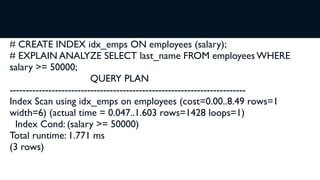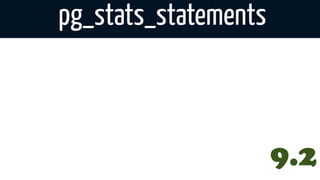Postgres demystified
- 1. Postgres Demystified Craig Kerstiens @craigkerstiens http://www.craigkerstiens.com https://speakerdeck.com/u/craigkerstiens/p/postgres-demystified
- 4. Postgres Demystified We’re Hiring
- 5. Getting Setup Postgres.app
- 6. Agenda Brief History Developing w/ Postgres Postgres Performance Querying
- 7. Postgres History Post Ingress Postgres Around since 1989/1995 PostgresQL Community Driven/Owned
- 8. MVCC Each query sees transactions committed before it Locks for writing don’t conflict with reading
- 9. Why Postgres
- 10. Why Postgres “ its the emacs of databases”
- 12. Basics psql is your friend
- 13. Basics psql is your friend # dt # d # d tablename # x # e
- 14. Datatypes UUID date boolean timestamptz array interval integer smallint line bigint XML enum char money serial bytea point float inet polygon numeric circle cidr varchar tsquery text timetz path time timestamp box macaddr tsvector
- 15. Datatypes UUID date boolean timestamptz array interval integer smallint line bigint XML enum char money serial bytea point float inet polygon numeric circle cidr varchar tsquery text timetz path time timestamp box macaddr tsvector
- 16. Datatypes UUID date boolean timestamptz array interval integer smallint line bigint XML enum char money serial bytea point float inet polygon numeric circle cidr varchar tsquery text timetz path time timestamp box macaddr tsvector
- 17. Datatypes UUID date boolean timestamptz array interval integer smallint line bigint XML enum char money serial bytea point float inet polygon numeric circle cidr varchar tsquery text timetz path time timestamp macaddr box tsvector
- 18. Datatypes CREATE TABLE items ( id serial NOT NULL, name varchar (255), tags varchar(255) [], created_at timestamp );
- 19. Datatypes CREATE TABLE items ( id serial NOT NULL, name varchar (255), tags varchar(255) [], created_at timestamp );
- 20. Datatypes INSERT INTO items VALUES (1, 'Ruby Gem', '{“Programming”,”Jewelry”}', now()); INSERT INTO items VALUES (2, 'Django Pony', '{“Programming”,”Animal”}', now());
- 21. Datatypes UUID date boolean timestamptz array interval integer smallint line bigint XML enum char money serial bytea point float inet polygon numeric circle cidr varchar tsquery text timetz path time timestamp box macaddr tsvector
- 22. Extensions dblink hstore trigram uuid-ossp pgstattuple citext pgrowlocks pgcrypto isn ltree fuzzystrmatch cube earthdistance dict_int tablefunc unaccent btree_gist dict_xsyn
- 23. Extensions dblink hstore trigram uuid-ossp pgstattuple citext pgrowlocks pgcrypto isn ltree fuzzystrmatch cube earthdistance dict_int tablefunc unaccent btree_gist dict_xsyn
- 24. NoSQL in your SQL CREATE EXTENSION hstore; CREATE TABLE users ( id integer NOT NULL, email character varying(255), data hstore, created_at timestamp without time zone, last_login timestamp without time zone );
- 25. hStore INSERT INTO users VALUES ( 1, '[email protected]', 'sex => "M", state => “California”', now(), now() );
- 26. JSON SELECT '{"id":1,"email": "[email protected]",}'::json; V8 w/ PLV8 9.2
- 27. JSON SELECT '{"id":1,"email": "[email protected]",}'::json; V8 w/ PLV8 9.2
- 28. JSON SELECT '{"id":1,"email": "[email protected]",}'::json; create or replace function V8 w/ PLV8 js(src text) returns text as $$ return eval( "(function() { " + src + "})" )(); $$ LANGUAGE plv8; 9.2
- 29. JSON SELECT '{"id":1,"email": "[email protected]",}'::json; create or replace function V8 w/ PLV8 js(src text) returns text as $$ return eval( Bad Idea "(function() { " + src + "})" )(); $$ LANGUAGE plv8; 9.2
- 30. Range Types 9.2
- 31. Range Types CREATE TABLE talks (room int, during tsrange); INSERT INTO talks VALUES (3, '[2012-09-24 13:00, 2012-09-24 13:50)'); 9.2
- 32. Range Types CREATE TABLE talks (room int, during tsrange); INSERT INTO talks VALUES (3, '[2012-09-24 13:00, 2012-09-24 13:50)'); ALTER TABLE talks ADD EXCLUDE USING gist (during WITH &&); INSERT INTO talks VALUES (1108, '[2012-09-24 13:30, 2012-09-24 14:00)'); ERROR: conflicting key value violates exclusion constraint "talks_during_excl" 9.2
- 33. Full Text Search
- 34. Full Text Search TSVECTOR - Text Data TSQUERY - Search Predicates Specialized Indexes and Operators
- 35. Datatypes UUID date boolean timestamptz array interval integer smallint line bigint XML enum char money serial bytea point float inet polygon numeric circle cidr varchar tsquery text timetz path time timestamp macaddr box tsvector
- 36. PostGIS
- 37. PostGIS 1. New datatypes i.e. (2d/3d boxes)
- 38. PostGIS 1. New datatypes i.e. (2d/3d boxes) 2. New operators i.e. SELECT foo && bar ...
- 39. PostGIS 1. New datatypes i.e. (2d/3d boxes) 2. New operators i.e. SELECT foo && bar ... 3. Understand relationships and distance i.e. person within location, nearest distance
- 41. Performance
- 42. Sequential Scans
- 44. Sequential Scans They’re Bad (most of the time)
- 45. Indexes
- 47. Indexes They’re Good (most of the time)
- 48. Indexes B-Tree Generalized Inverted Index (GIN) Generalized Search Tree (GIST) K Nearest Neighbors (KNN) Space Partitioned GIST (SP-GIST)
- 49. Indexes B-Tree Default Usually want this
- 50. Indexes Generalized Inverted Index (GIN) Use with multiple values in 1 column Array/hStore
- 51. Indexes Generalized Search Tree (GIST) Full text search Shapes
- 52. Understanding Query Perf Given SELECT last_name FROM employees WHERE salary >= 50000;
- 53. Explain # EXPLAIN SELECT last_name FROM employees WHERE salary >= 50000; QUERY PLAN ------------------------------------------------------------------------- Seq Scan on employees (cost=0.00..35811.00 rows=1 width=6) Filter: (salary >= 50000) (3 rows)
- 54. Explain # EXPLAIN SELECT last_name FROM employees WHERE salary >= 50000; Startup Cost QUERY PLAN ------------------------------------------------------------------------- Seq Scan on employees (cost=0.00..35811.00 rows=1 width=6) Filter: (salary >= 50000) (3 rows)
- 55. Explain # EXPLAIN SELECT last_name FROM employees WHERE salary >= 50000; Max Time Startup Cost QUERY PLAN ------------------------------------------------------------------------- Seq Scan on employees (cost=0.00..35811.00 rows=1 width=6) Filter: (salary >= 50000) (3 rows)
- 56. Explain # EXPLAIN SELECT last_name FROM employees WHERE salary >= 50000; Max Time Startup Cost QUERY PLAN ------------------------------------------------------------------------- Seq Scan on employees (cost=0.00..35811.00 rows=1 width=6) Filter: (salary >= 50000) (3 rows) Rows Returned
- 57. Explain # EXPLAIN ANALYZE SELECT last_name FROM employees WHERE salary >= 50000; QUERY PLAN ------------------------------------------------------------------------- Seq Scan on employees (cost=0.00..35811.00 rows=1 width=6) (actual time=2.401..295.247 rows=1428 loops=1) Filter: (salary >= 50000) Total runtime: 295.379 (3 rows)
- 58. Explain # EXPLAIN ANALYZE SELECT last_name FROM employees WHERE salary >= 50000; Startup Cost QUERY PLAN ------------------------------------------------------------------------- Seq Scan on employees (cost=0.00..35811.00 rows=1 width=6) (actual time=2.401..295.247 rows=1428 loops=1) Filter: (salary >= 50000) Total runtime: 295.379 (3 rows)
- 59. Explain # EXPLAIN ANALYZE SELECT last_name FROM employees WHERE salary >= 50000; Startup Cost QUERY PLAN Max Time ------------------------------------------------------------------------- Seq Scan on employees (cost=0.00..35811.00 rows=1 width=6) (actual time=2.401..295.247 rows=1428 loops=1) Filter: (salary >= 50000) Total runtime: 295.379 (3 rows)
- 60. Explain # EXPLAIN ANALYZE SELECT last_name FROM employees WHERE salary >= 50000; Startup Cost QUERY PLAN Max Time ------------------------------------------------------------------------- Seq Scan on employees (cost=0.00..35811.00 rows=1 width=6) (actual time=2.401..295.247 rows=1428 loops=1) Filter: (salary >= 50000) Total runtime: 295.379 (3 rows) Rows Returned
- 61. Explain # EXPLAIN ANALYZE SELECT last_name FROM employees WHERE salary >= 50000; Startup Cost QUERY PLAN Max Time ------------------------------------------------------------------------- Seq Scan on employees (cost=0.00..35811.00 rows=1 width=6) (actual time=2.401..295.247 rows=1428 loops=1) Filter: (salary >= 50000) Total runtime: 295.379 (3 rows) Rows Returned
- 62. # CREATE INDEX idx_emps ON employees (salary);
- 63. # CREATE INDEX idx_emps ON employees (salary); # EXPLAIN ANALYZE SELECT last_name FROM employees WHERE salary >= 50000; QUERY PLAN ------------------------------------------------------------------------- Index Scan using idx_emps on employees (cost=0.00..8.49 rows=1 width=6) (actual time = 0.047..1.603 rows=1428 loops=1) Index Cond: (salary >= 50000) Total runtime: 1.771 ms (3 rows)
- 64. # CREATE INDEX idx_emps ON employees (salary); # EXPLAIN ANALYZE SELECT last_name FROM employees WHERE salary >= 50000; QUERY PLAN ------------------------------------------------------------------------- Index Scan using idx_emps on employees (cost=0.00..8.49 rows=1 width=6) (actual time = 0.047..1.603 rows=1428 loops=1) Index Cond: (salary >= 50000) Total runtime: 1.771 ms (3 rows)
- 65. Indexes Pro Tips
- 66. Indexes Pro Tips CREATE INDEX CONCURRENTLY
- 67. Indexes Pro Tips CREATE INDEX CONCURRENTLY CREATE INDEX WHERE foo=bar
- 68. Indexes Pro Tips CREATE INDEX CONCURRENTLY CREATE INDEX WHERE foo=bar SELECT * WHERE foo LIKE ‘%bar% is BAD
- 69. Indexes Pro Tips CREATE INDEX CONCURRENTLY CREATE INDEX WHERE foo=bar SELECT * WHERE foo LIKE ‘%bar% is BAD SELECT * WHERE Food LIKE ‘bar%’ is OKAY
- 70. Extensions dblink hstore trigram uuid-ossp pgstattuple citext pgrowlocks pgcrypto isn ltree fuzzystrmatch cube earthdistance dict_int tablefunc unaccent btree_gist dict_xsyn
- 72. Cache Hit Rate SELECT 'index hit rate' as name, (sum(idx_blks_hit) - sum(idx_blks_read)) / sum(idx_blks_hit + idx_blks_read) as ratio FROM pg_statio_user_indexes union all SELECT 'cache hit rate' as name, case sum(idx_blks_hit) when 0 then 'NaN'::numeric else to_char((sum(idx_blks_hit) - sum(idx_blks_read)) / sum(idx_blks_hit + idx_blks_read), '99.99')::numeric end as ratio FROM pg_statio_user_indexes;)
- 73. Index Hit Rate SELECT relname, 100 * idx_scan / (seq_scan + idx_scan), n_live_tup FROM pg_stat_user_tables ORDER BY n_live_tup DESC;
- 74. Index Hit Rate relname | percent_of_times_index_used | rows_in_table ---------------------+-----------------------------+--------------- events | 0 | 669917 app_infos_user_info | 0 | 198218 app_infos | 50 | 175640 user_info | 3 | 46718 rollouts | 0 | 34078 favorites | 0 | 3059 schema_migrations | 0 | 2 authorizations | 0 | 0 delayed_jobs | 23 | 0
- 75. pg_stats_statements 9.2
- 76. pg_stats_statements $ select * from pg_stat_statements where query ~ 'from users where email'; userid │ 16384 dbid │ 16388 query │ select * from users where email = ?; calls │ 2 total_time │ 0.000268 rows │ 2 shared_blks_hit │ 16 shared_blks_read │ 0 shared_blks_dirtied │ 0 shared_blks_written │ 0 local_blks_hit │ 0 local_blks_read │ 0 local_blks_dirtied │ 0 9.2 local_blks_written │ 0 temp_blks_read │ 0 temp_blks_written │ 0 time_read │ 0 time_write │ 0
- 77. pg_stats_statements 9.2
- 78. pg_stats_statements SELECT query, calls, total_time, rows, 100.0 * shared_blks_hit / nullif(shared_blks_hit + shared_blks_read, 0) AS hit_percent FROM pg_stat_statements ORDER BY total_time DESC LIMIT 5; ---------------------------------------------------------------------- query | UPDATE pgbench_branches SET bbalance = bbalance + ? WHERE bid = ?; calls | 3000 total_time | 9609.00100000002 rows | 2836 hit_percent | 99.9778970000200936 9.2
- 80. Querying
- 81. Window Functions Example: Biggest spender by state
- 82. Window Functions SELECT email, users.data->'state', sum(total(items)), rank() OVER (PARTITION BY users.data->'state' ORDER BY sum(total(items)) desc) FROM users, purchases WHERE purchases.user_id = users.id GROUP BY 1, 2;
- 83. Window Functions SELECT email, users.data->'state', sum(total(items)), rank() OVER (PARTITION BY users.data->'state' ORDER BY sum(total(items)) desc) FROM users, purchases WHERE purchases.user_id = users.id GROUP BY 1, 2;
- 84. Extensions dblink hstore trigram uuid-ossp pgstattuple citext pgrowlocks pgcrypto isn ltree fuzzystrmatch cube earthdistance dict_int tablefunc unaccent btree_gist dict_xsyn
- 85. Fuzzystrmatch
- 86. Fuzzystrmatch SELECT soundex('Craig'), soundex('Will'), difference('Craig', 'Will');
- 87. Fuzzystrmatch SELECT soundex('Craig'), soundex('Will'), difference('Craig', 'Will'); SELECT soundex('Craig'), soundex('Greg'), difference('Craig', 'Greg'); SELECT soundex('Willl'), soundex('Will'), difference('Willl', 'Will');
- 88. Moving Data Around copy (SELECT * FROM users) TO ‘~/users.csv’; copy users FROM ‘~/users.csv’;
- 89. db_link SELECT dblink_connect('myconn', 'dbname=postgres'); SELECT * FROM dblink('myconn','SELECT * FROM foo') AS t(a int, b text); a | b -------+------------ 1 | example 2 | example2
- 90. Foreign Data Wrappers oracle mysql odbc twitter sybase redis jdbc files couch s3 www ldap informix mongodb
- 91. Foreign Data Wrappers CREATE EXTENSION redis_fdw; CREATE SERVER redis_server FOREIGN DATA WRAPPER redis_fdw OPTIONS (address '127.0.0.1', port '6379'); CREATE FOREIGN TABLE redis_db0 (key text, value text) SERVER redis_server OPTIONS (database '0'); CREATE USER MAPPING FOR PUBLIC SERVER redis_server OPTIONS (password 'secret');
- 92. Query Redis from Postgres SELECT * FROM redis_db0; SELECT id, email, value as visits FROM users, redis_db0 WHERE ('user_' || cast(id as text)) = cast(redis_db0.key as text) AND cast(value as int) > 40;
- 93. All are not equal oracle mysql odbc twitter sybase redis jdbc files couch s3 www ldap informix mongodb
- 94. Production Ready FDWs oracle mysql odbc twitter sybase redis jdbc files couch s3 www ldap informix mongodb
- 95. Readability
- 96. Readability WITH top_5_products AS ( SELECT products.*, count(*) FROM products, line_items WHERE products.id = line_items.product_id GROUP BY products.id ORDER BY count(*) DESC LIMIT 5 ) SELECT users.email, count(*) FROM users, line_items, top_5_products WHERE line_items.user_id = users.id AND line_items.product_id = top_5_products.id GROUP BY 1 ORDER BY 1;
- 97. Common Table Expressions WITH top_5_products AS ( SELECT products.*, count(*) FROM products, line_items WHERE products.id = line_items.product_id GROUP BY products.id ORDER BY count(*) DESC LIMIT 5 ) SELECT users.email, count(*) FROM users, line_items, top_5_products WHERE line_items.user_id = users.id AND line_items.product_id = top_5_products.id GROUP BY 1 ORDER BY 1;
- 98. Common Table Expressions WITH top_5_products AS ( SELECT products.*, count(*) FROM products, line_items WHERE products.id = line_items.product_id GROUP BY products.id ORDER BY count(*) DESC LIMIT 5 ) SELECT users.email, count(*) FROM users, line_items, top_5_products WHERE line_items.user_id = users.id AND line_items.product_id = top_5_products.id GROUP BY 1 ORDER BY 1;
- 99. Common Table Expressions WITH top_5_products AS ( SELECT products.*, count(*) FROM products, line_items WHERE products.id = line_items.product_id GROUP BY products.id ORDER BY count(*) DESC LIMIT 5 ) SELECT users.email, count(*) FROM users, line_items, top_5_products WHERE line_items.user_id = users.id AND line_items.product_id = top_5_products.id GROUP BY 1 ’ ORDER BY 1;
- 100. Common Table Expressions WITH top_5_products AS ( SELECT products.*, count(*) FROM products, line_items WHERE products.id = line_items.product_id GROUP BY products.id ORDER BY count(*) DESC LIMIT 5 ) SELECT users.email, count(*) FROM users, line_items, top_5_products WHERE line_items.user_id = users.id AND line_items.product_id = top_5_products.id GROUP BY 1 Don’t do this in production ’ ORDER BY 1;
- 101. Brief History Developing w/ Postgres Postgres Performance Querying
- 102. Extras
- 103. Extras Listen/Notify
- 104. Extras Listen/Notify Per Transaction Synchronous Replication
- 105. Extras Listen/Notify Per Transaction Synchronous Replication SELECT for UPDATE
- 106. Postgres - TLDR Datatypes Fast Column Addition Conditional Indexes Listen/Notify Transactional DDL Table Inheritance Foreign Data Wrappers Per Transaction sync replication Concurrent Index Creation Window functions Extensions NoSQL inside SQL Common Table Expressions Momentum
- 107. Questions? Craig Kerstiens @craigkerstiens http://www.craigkerstiens.com https://speakerdeck.com/u/craigkerstiens/p/postgres-demystified


















![Datatypes
CREATE TABLE items (
id serial NOT NULL,
name varchar (255),
tags varchar(255) [],
created_at timestamp
);](https://image.slidesharecdn.com/postgresdemystified-121206095828-phpapp02/85/Postgres-demystified-18-320.jpg)
![Datatypes
CREATE TABLE items (
id serial NOT NULL,
name varchar (255),
tags varchar(255) [],
created_at timestamp
);](https://image.slidesharecdn.com/postgresdemystified-121206095828-phpapp02/85/Postgres-demystified-19-320.jpg)























































































